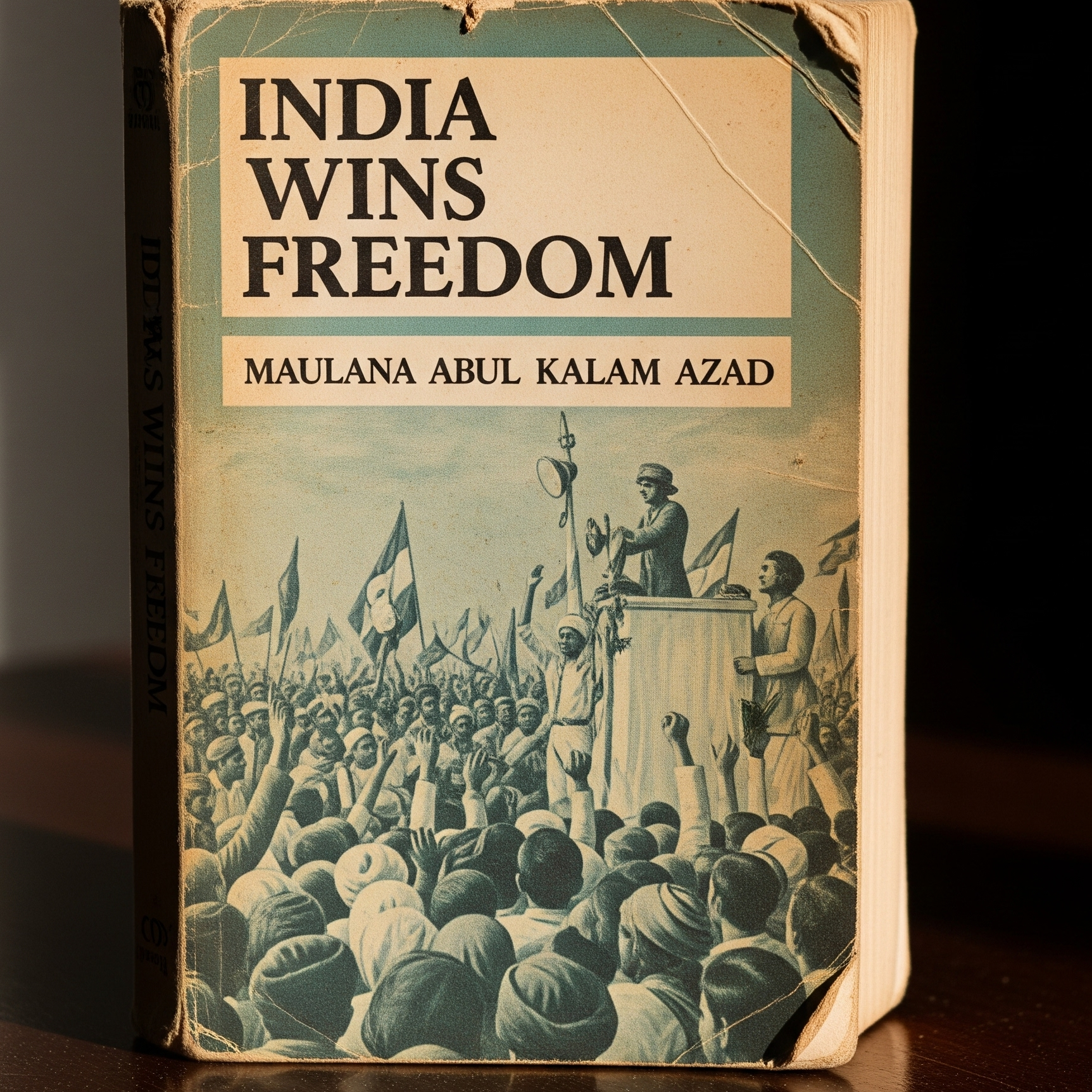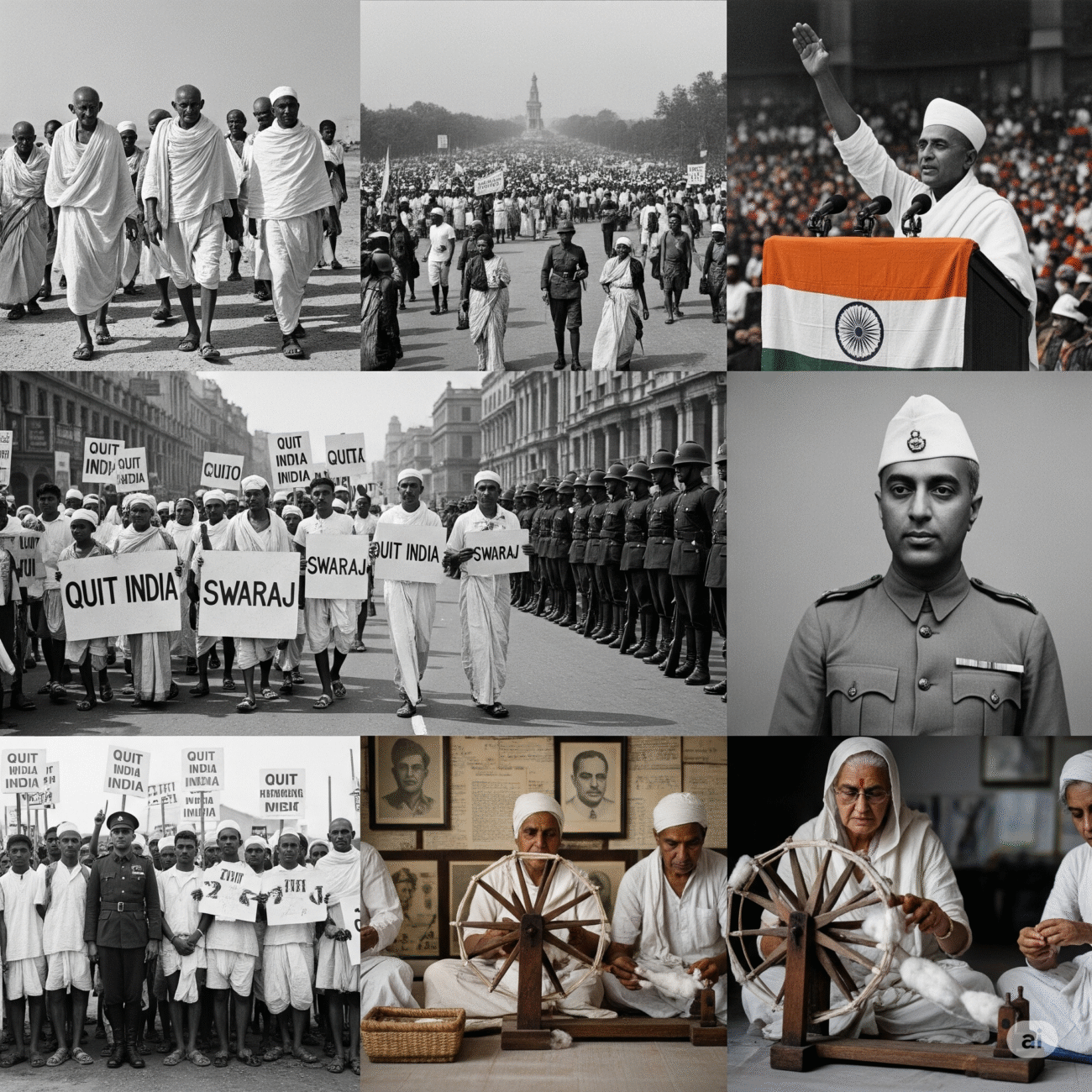India Wins Freedom was written by Abul Kalam Azad, original name Abul Kalam Ghulam Muhiyuddin, also called Maulana Abul Kalam Azad or Maulana Azad, (Born November 11, 1888, Mecca, Died February 22, 1958, New Delhi, India), Islamic theologian who was one of the leaders of the Indian independence movement against British rule in the first half of the 20th century. He was highly respected throughout his life as a man of high moral integrity.
Who was Maulana Abdul Kalam Azad?
Maulana Azad was a prominent political leader during the time of independence. He worked for religious harmony and opposed the partition of India. Gandhi profoundly inspired Azad and was an active supporter of the latter’s non-violence, civil disobedience, and non-cooperation movement. Unlike other Muslim leaders, he condemned communal separation advocated by Muhammad Ali Jinnah and other Muslim leaders and stressed the fact that national freedom was of greater importance than communal freedom. He worked for religious harmony and became a staunch advocate against partition. He lived long not just to witness Indian Independence and the subsequent Partition, but also served as free India’s first Education Minister.

What is the book about?
This book talks about his views from some 10 to 15 years before India gained its independence. These are monumental events and very important in the history of our independence. Azad talks about how these events occurred, the conditions of that time what happened between the British, Congress, Muslim League, and Mahatma Gandhi.
Azad also expressed his opinions about the decisions taken by Gandhi, Jawaharlal Nehru, Sardar Patel, and all other prominent Congress people.
He describes his relationships with stalwarts like Gandhi, Nehru, Patel, and Jinnah, sharing a wealth of anecdotes that shed light on their characters, their ideologies, and their political inclinations. Azad’s account of the negotiation of India’s independence and his stern opposition to the partition of India and Pakistan is particularly insightful. He believed firmly in a united India, where Hindus and Muslims could co-exist harmoniously.
When was the book published?
This book was written in 1957. There was a portion of the book that was not published because Maulana Azad thought it might upset Jawaharlal Nehru, who was one of his closest friends. For thirty years, the entire text of this autobiographical story was kept under seal in the National Archives in New Delhi and the National Library in Calcutta. As a result of a court order, the full text was made public in September 1988. Not only have all of the original words and phrases been replicated, but the tone and mood have also been completely restored. The text now makes clear that the long-simmering controversy surrounding the previously unpublished pages was entirely justified.
What is the theme of the book?
The 1959 book offers a firsthand account of the discussions, decisions, and events that influenced India’s path to independence from British colonial control. It reflects Azad’s personal opinions, experiences, and criticisms of other leaders in addition to being a historical record.
The book mentions Azad’s early participation in the nationalist movement and the development of his political journey, which were firmly anchored in secularism, unity, and non-violence, and this is where the story starts. He talks about his affiliation with the Indian National Congress and influential people like Muhammad Ali Jinnah, Jawaharlal Nehru, Sardar Vallabhbhai Patel, and Mahatma Gandhi. Azad vehemently opposed the notion of partitioning India along religious lines and was a supporter of Hindu-Muslim unity.

A huge part of the book is about the ideological and political disagreements within the Indian National Congress and between the Congress and the Muslim League. Azad has a negative view of the communal politics that became more popular in the 1940s. He says that the British used a “divide and rule” strategy that made the differences between Hindus and Muslims worse, which led to calls for a separate Muslim state.
Summary of the book
Some paragraphs mention the pivotal moments like the Quit India Movement in 1942, the Cabinet Mission Plan in 1946, and the Mountbatten Plan in 1947. He was disappointed with the Congress leadership for agreeing to Partition, viewing it as a betrayal of the ideals of secularism and unity. Azad particularly takes issue with the choices made in the closing days of British rule, feeling that more could have been done to avert Partition and the resulting communal strife.
He talks about the roles played by Gandhi, Nehru, Patel, and Jinnah. He acknowledges Gandhi’s moral leadership but points out that Gandhi’s responses to Muslim issues sometimes fell short. He admires Nehru’s vision for a modern India, yet he has some reservations about how Nehru managed negotiations with the Muslim League. Patel comes across as a practical and influential figure, though he felt he was more open to the idea of Partition than was truly necessary. As for Jinnah, Azad believes he shifted from being a nationalist to a communal leader, largely as a result of feeling politically isolated and receiving encouragement from the British.
The book under review gives us insight into the political life of Maulana Azad’s struggle for freedom. It also provides psychological insight into the minds of some of the important political personalities in the Congress high command. It presents one of the many sides of the picture in a hazy way.
The last chapter of the book is titled ” The End of a Dream”. Maulana narrates how Nehru and even Gandhi gave up by accepting the two-nation theory in frustration. Maulana had tried to his last extent to break that idea. For that, he even presented the interim government system, which was accepted by the Britishers and even by the Muslim League. The book, to a large extent, will give you an unbiased view of India’s freedom struggle.
CONCLUSION
In conclusion, Abul Kalam Azad’s activities after independence continued his lifelong struggle for Indian freedom. He showed a strong commitment to education, unity, and secularism. His thoughts on the past were honest and reflective, recognizing both the successes and failures of the freedom movement. Azad envisioned a future filled with hope, determination, and a strong belief in the potential of a united, progressive India. Through his efforts, he created a lasting legacy that still inspires and guides the nation.
FAQs
Q.1. Who was Maulana Abul Kalam Azad?
Answer-India’s first Education Minister and a prominent freedom fighter.
Q.2. What is India Wins Freedom?
Answer-Maulana Azad’s autobiography is about India’s struggle for independence.
Q.3. When was India Wins Freedom published?
Answer-In 1957.
Q.4. What is special about the book’s release?
Answer-Parts of it were kept classified until 1988 for political sensitivity.
Q.5. What role did Azad play in India’s freedom movement?
Answer-He was a senior Congress leader, journalist, and advocate of Hindu–Muslim unity.
Q6. What themes does India Wins Freedom cover?
Answer-Partition, Congress politics, and Azad’s personal experiences.
Q.7. Why was some content withheld initially?
Answer-It contained frank opinions about key leaders and events.
Q.8. In what language was India Wins Freedom originally written?
Answer-English.
Q.9. What does the book reveal about Partition?
Answer-Azad viewed it as a tragic and avoidable event.
Q.10. Why is Maulana Azad remembered today?
Answer-For his contributions to education, unity, and India’s independence.
Also read – Who was the traveler Abdul Razzaq?
